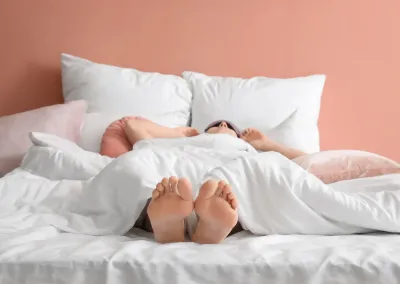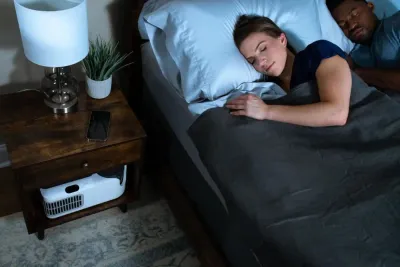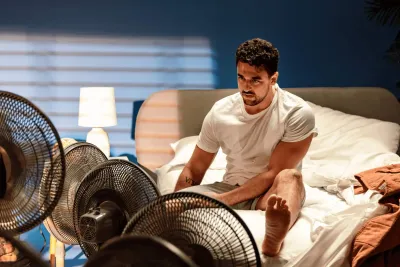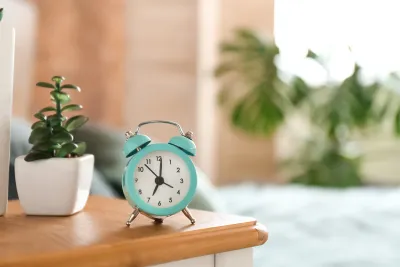How to Stay Cool at Night: Creating a Comfortable Sleeping Environment
Ana Marie Schick: Resident Sleep Expert and Certified Health Coach • Jan 14, 2026

Key Takeaways
Staying cool at night is about smart environment control, breathable choices, and tools that help your body shed heat efficiently.
- Managing your sleep environment matters. Lowering the thermostat, improving airflow, and using breathable bedding can quickly reduce nighttime heat buildup.
- What you wear to bed counts. Lightweight, moisture-wicking sleepwear—especially cotton or linen—helps your body release heat instead of trapping it.
- Simple evening habits help cool you down. Cool showers, lighter dinners, skipping alcohol, and even a chilled water bottle can lower core body temperature before sleep.
- Sleep tech offers targeted relief. Bed cooling systems like the Chilipad Dock Pro deliver precise temperature control without affecting your partner’s side.
- Long-term comfort adds up. Mattress materials, fewer heat-producing electronics, and better air circulation support cooler, more consistent sleep.
How to stay cool at night is a common concern for hot sleepers, people living in warm climates, and anyone who struggles with overheating during sleep.
If you find yourself tossing and turning, searching for the cool side of the pillow, or waking up drenched in sweat, you’re not alone.
Over 57% of Americans report sleeping too hot at least occasionally, which can drastically affect sleep quality and next-day wellbeing. [1]
This guide is for hot sleepers, those in warm or humid climates, and anyone dealing with night sweats or hot flashes. Learn why staying cool at night boosts sleep quality and discover practical tips to create a cooler, more comfortable sleep environment.
Why Do People Get Hot at Night and Why Does It Matter?
It's common to feel hot while sleeping, and many people experience this every night, which can impact their ability to get a good night's sleep.
Are you one of them?
Have you found yourself tossing and turning because of a warm room or a warm bed, struggling to find that perfect cool spot? You're not alone.
A recent survey found that about 57% of Americans occasionally struggle to sleep in uncomfortably warm conditions. [2] Many of us have faced the challenge of sleeping in less-than-ideal temperatures.
Particularly during the warm summer months or in naturally warmer climates.
Various factors can cause you to sleep hot at night. While sleeping in a cold room is nice, leaving the air conditioning on all night in extreme heat can become expensive.
Now that you understand why staying cool at night is important for your sleep quality. Below are simple, science-backed strategies you can use to keep your body and bedroom cool at night.
Why Does Staying Cool at Night Matter?
A cooler environment can help your body regulate its temperature, allowing you to fall asleep faster and stay asleep longer.
When your body temperature drops slightly at night, it signals your brain to enter deeper, more restorative sleep stages. The best sleep temperature ranges between 60°F and 67°F (15.6°C to 19.4°C). [3]
If your room is warmer than this, it can be a real challenge to fall or stay asleep throughout the night.
Below are a few practical strategies and tips to help you stay cool at night and improve your sleep, resulting in a better night's rest.
Save Up to 20%! Cooler Nights, Better Sleep
Save now and sleep cooler! Our cooling mattress toppers maintain the perfect temperature, so you stay cool, dry, and comfortable throughout the night. Cool your current mattress down to a crisp 55°F for refreshing, sweat-free sleep.

Simple Ways to Lower Body Heat Before Bed
If you tend to overheat at night, try these tips to cool down and improve your sleep quality, especially for hot sleepers and men and women who experience night sweats and hot flashes.
Upgrade Your Bed with a Cooling Mattress Pad
If you sleep hot and wake up from sweating during the night, you may want to explore cooling mattress pads. When you sleep hot, your body releases heat into the bedding and mattress. There are options ,including a bed cooling system, like the Chilipad.
The Chilipad is a cooling mattress pad that fits over your existing mattress, unlike Eight Sleep, so you don't have to replace your current bed.
It provides dual temperature zones, allowing each side of the bed to be set to a personalized sleep temperature, making it great for couples who prefer different sleeping preferences, warm or cool.
- Adjusting core temperature allows quick access to uninterrupted, deep sleep, which enhances overall health and wellness.
- We offer two different bed cooling systems: the Chilipad Dock Pro, the best cooling mattress topper, and Cube, the original mattress cooling pad.
- They cool you down by circulating cold water through a mattress pad that fits over most mattress sizes. The system connects to a control unit filled with water, which chills the water to your desired temperature.
Take a Warm Shower or Bath
Yes, it's true! Even though it might not seem that way at first. While warm water initially raises your body heat, it actually triggers your body's natural cooling response.
This leads to a drop in your internal temperature, bringing various benefits.
Tip: If you don't want it to be warm, you can always hop in a cold shower or bath. The cold shower can help cool you down by reducing your core heat and promoting a more comfortable sleep.
Make sure the water temperature is lukewarm, not hot or cold, when taking a bath or shower. If the water is too hot, it can cause your body to overheat, leading to dehydration, dizziness, and other health issues.
Research shows that taking a warm shower or relaxing bath, ideally 90 minutes before bedtime, can help you fall asleep an average of 10 minutes faster than usual. [4]
Choose Lighter, Smaller Meals Leading to Bedtime
It's best to avoid heavy meals before bed. We know it can be challenging not to overindulge in your favorite meal or snack late at night. Heavy foods, especially those high in spices, carbohydrates, and fats, require a lot of energy to digest.
As much as we'd like to think it, our bodies aren't designed to digest food while we sleep, which can lead to weight gain, heartburn, and even poor sleep.
- Consider healthy meals such as salad, fish, or chicken.
- For a late-night snack, try yogurt, bananas, or almonds.
- Drink a glass of cold water to cool down at night and curb hunger before bedtime.
Not sure which foods can help with your sleep? We've got you covered by listing the best foods to help promote better sleep.

Limit or Avoid Alcohol Before Bedtime
Getting together with friends or family can be a lot of fun, but it's important to be mindful of how much alcohol you consume.
If possible, try to limit alcohol consumption. It can cause blood vessels to expand and the surface near your skin, making you more prone to sweating.
- Instead of drinking wine, select a sleep-enhancing tea. Another option can be a glass of warm milk.
- Check out our blog to discover the best natural drinks that can help improve your sleep.
Why Morning Workouts Help You Sleep Cooler
When it comes to exercise, it's recommended to do it in the morning or earlier in the day. A study done by Appalachian State University followed three groups exercising at 7 am, 1 pm, or 7 pm, 3 days per week. [5]
The study found that the participants who got the deepest, longest sleep exercised in the morning. If your daily routine only provides the evening to exercise, allow yourself to relax leading to bedtime. So, try to exercise 90 minutes before bedtime.
Early exercise will help your core temperature and endorphin levels return to favorable levels for a good night's rest.
Exercising in the morning not only helps cool your body temperature but also shifts your circadian rhythm, making you more alert in the morning and more tired in the evening.
Set Your Ceiling Fan to Counterclockwise for Cooling
A ceiling fan can not only offer a cool breeze but also help cool the room-temperature air. During the warmer months, your ceiling fan should be running counterclockwise.
- This direction pushes air downward, creating a wind-chill effect that makes you feel cooler by increasing air circulation directly around you. Running the fan counterclockwise pushes air downward, creating a cooling breeze by increasing air circulation and helping sweat evaporate evenly throughout the room.
How do you know it's in the right direction?
While standing right under the fan, you should feel a breeze of cooler air. The airflow generated creates a wind-chill effect, making you "feel" cooler and helping cool the room over time.
Winter Sleeping Tip: Did you know that rotating your fan clockwise during the colder months helps push warm air upwards, allowing the heat to circulate and keep you and the room warmer.

Cooking Strategy: Keep Your Home Cooler at Night
We all enjoy homemade meals, but cooking indoors can raise indoor temperatures. Plan your meal strategy on those hot summer nights. Limiting indoor cooking time can help significantly cool down your house during hot weather.
- Instead of using the traditional oven or stove, which can increase your kitchen's temperature, consider using alternative cooking appliances like Instant Pots, crockpots, or your outdoor grill.
Add Window Blinds and Blackout Curtains
Improving the effectiveness of windows, such as including blinds and blackout curtains, can significantly affect your room's temperature, particularly during the hotter months.
- Keep your curtains shut, as windows can let in about 25% of the summer heat. [6]
- During the day, reduce heat exposure by closing window blinds or curtains to reflect and reduce heat radiating through windows.
This simple yet effective step not only keeps your bedroom cooler during hot weather but also helps you save energy by reducing your reliance on your AC unit.
Find The Perfect Spot For Your Bed
Getting a good night's sleep isn't just about your mattress. It also involves where you place your bed, which matters too. Keep your sleep cooler by placing your bed away from windows and areas that get a lot of sun during the day.
- Since hot air rises, if your bedroom is on the second or third floor of your house, consider moving to a lower level for a cooler environment.
Flip To The Cool Side Of The Pillow
Have trouble finding a pillow that stays cool? We know there's nothing worse than waking up to a hot pillow. When it comes to cooling your pillow, you have a few options:
- Flip the pillowcase throughout the evening.
- Purchase cooling pillowcases.
Having a cooling pillow can be a game-changer. They feature ventilation holes throughout the memory foam pillow to improve airflow, keeping it nice and cool.
Freeze the Sheets: A Short-Term Fix
Cool bedsheets can provide some initial relief during the hot summer nights and months. Some recommend freezing your bedding for immediate cooling relief as you get ready for bed.
- Although cooling sheets are passive and don’t maintain their cool feel throughout the night, they do stay refreshingly cool for 30 to 40 minutes. That's just long enough to help you settle in before they warm up.
Bedsheet Tips: Silk sheets are a great option for people who tend to sleep hot or who experience night sweats or hot flashes. Natural fibers like cotton and linen are recommended for bedding to help keep cool during sleep.
Why Sleepwear Matters
The clothing you select can affect your body temperature. The secret to staying cool is the fabric you choose to wear. Selecting the right type of clothing materials can help you stay cold sleeping.
- Shop for loose-fitting cotton, moisture-wicking, silk, or bamboo-based clothing. They tend to be more breathable than other materials.
Freeze a Washcloth for Instant Relief
One of the most common places people sweat is on their head and face, so keeping this area cool is important. As we've discussed, sweating can make it difficult to fall asleep as it causes discomfort.
- Freeze a washcloth for a few hours before bed.
- Once frozen, wrap the washcloth around your forehead, temples, or any other warm area of your face.
- Hold it in place for a few minutes to allow the coolness to seep into your skin.
- Repeat this process until you feel comfortable in warmer conditions to help you fall asleep.
Change Your Sleeping Position
Your sleeping position can actually affect how hot or cool you feel at night, even if you didn’t realize it before.
For example, if you usually sleep on your back or cuddle up close with your partner, you might be trapping more heat than you think.
Since mattresses tend to hold onto body heat, sleeping on your side can help. Why? The less of your body that touches the mattress, the less heat gets trapped.
So, switching up your position might be a simple way to stay cooler and sleep more comfortably.
- If sleeping with a partner, it is best to avoid direct contact throughout the night. The transfer of body heat can make you both feel too warm and uncomfortable.
- To stay cool, try the "starfish" sleeping position with your arms and legs spread out to the bed's four corners. Roughly 5% of people choose to sleep in the starfish sleeping position. [7]
Final Thought
Whether it's modifying your bedtime routine, adjusting your room setup, or choosing the right sleepwear, each step you take towards a cooler night can vastly improve the quality of sleep. Try out the tips above to transform restless, hot nights into peaceful, cool sleep.
Frequently Asked Questions About Staying Cool at Night
Why Is It Important to Stay Cool at Night While Sleeping?
Staying cool at night helps your body lower its core temperature, which signals your brain to enter deeper sleep stages, such as REM. When you overheat, sleep becomes lighter and more fragmented, reducing physical recovery and mental clarity.
How Can I Get Colder at Night?
If you want to stay cool at night during hot weather or any time of the season, consider these simple tips:
- Use light, breathable bedding made from natural fibers like cotton and linen.
- Wear moisture-wicking pajamas.
- Keep your room cool with a fan or air conditioner.
- Use a bed cooling system or a cooling pillow to help regulate your body temperature.
- Take a refreshing shower before bedtime to lower your core body temperature.
- Stay hydrated and have a glass of cold water next to your bed.
- Keep blinds closed during the day to block out heat.
- Sleep on the lowest floor of your home.
- Pre-cool your sheets in the freezer.
- Apply ice packs to pulse points.
- Use a dehumidifier to reduce humidity.
- Create a cross breeze by opening windows on opposite sides of the room.
- Avoid heavy and spicy meals close to bedtime.
- Limit exercise before bed.
What Sleeping Position Keeps You Cool?
Sleeping on your back with your arms and legs spread slightly helps heat escape and improves airflow, making it one of the coolest positions. Side sleepers can stay cooler by keeping limbs from pressing together. Stomach sleeping tends to trap heat and is more likely to cause overheating.
How Do Cooling Bed Systems Work, and Are They Effective?
The Chilipad bed cooling system circulates water through a mattress pad to adjust the bed's temperature, promoting deeper, more restful sleep. You can set the temperature to your desired level, and the system adjusts the water temperature to cool or warm the bed accordingly.
What Is the Recommended Sleep Temperature?
The ideal bedroom temperature for optimal sleep ranges between 60°F and 67°F (15.6°C to 19.4°C).
Peer-Reviewed Research References
-
Gallup, Inc.
Sleep Temperature Linked to Overall Sleep Quality, Wellbeing.
Gallup.com, June 21, 2023.
Source Type: National Survey & Polling Data
Key Insight: Gallup polling data shows a strong association between perceived sleep temperature comfort and self-reported sleep quality, physical health, and overall wellbeing, highlighting temperature as a key environmental sleep factor.
View Resource
-
Ibid.
Source Type: National Survey & Polling Data
Key Insight: Reinforces the role of sleep temperature as a modifiable environmental factor linked to both mental and physical wellbeing outcomes.
-
Doheny, K.
Can’t Sleep? Adjust the Temperature.
WebMD, March 23, 2022.
Source Type: Medical Health Guidance
Key Insight: Explains how bedroom temperature influences sleep onset and continuity, emphasizing that cooler environments support the body’s natural nighttime temperature drop.
View Resource
-
Haghayegh, S., et al.
Before-Bedtime Passive Body Heating by Warm Shower or Bath to Improve Sleep: A Systematic Review and Meta-Analysis.
Sleep Medicine Reviews, 46, 124–135, 2019.
Source Type: Systematic Review & Meta-Analysis
Key Insight: Finds that passive body heating before bed can improve sleep latency and efficiency by enhancing the body’s subsequent nighttime cooling response.
View Study
-
Fairbrother, K. R.
The Effects of Aerobic Exercise Timing on Sleep Architecture.
Source Type: Academic Thesis / Research Study
Key Insight: Examines how exercise timing influences core body temperature, sleep stages, and overall sleep architecture, suggesting thermal regulation plays a role in sleep quality.
View Study
-
Woodhaven Lumber.
How New Windows Can Lower Your Energy Bill This Summer.
Woodhaven Lumber Blog, 2025.
Source Type: Industry & Environmental Resource
Key Insight: Discusses how improved home insulation and temperature control can reduce indoor heat buildup, indirectly supporting better sleep conditions during warmer months.
View Resource
-
Rayward, L., Ho, S. W. K., Green, D., & Little, J. P.
Sleep Disruption and Sleep Position: Increased Wake Frequency in Supine Predicts Lateral Position Preference.
Journal of Sleep Research, 34(1), e14325, 2025.
Source Type: Peer-Reviewed Sleep Study
Key Insight: Demonstrates that increased nighttime awakenings while sleeping supine are associated with a natural preference for lateral sleeping positions, linking sleep posture, arousals, and comfort.
View Study









